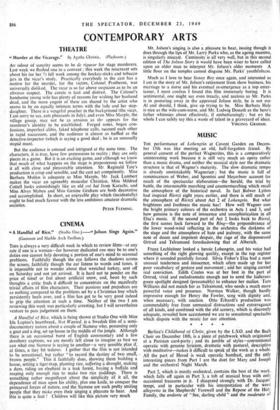CONTEMPORARY ARTS
THEATRE
44 Murder at the Vicarage." By Agatha Christie. (Playhouse.)
AN odour of sanctity seems to be de rigueur for stage murderers. Last week we flushed one in a convent ; this week the miscreant sets about his (or her ?) fell work among the hockey-sticks and tobacco jars in the vicar's study. Practically everybody in the cast has a motive for the murder, for the victim, Colonel Protheroe, was universally disliked. The vicar is so far above suspicion as to be an obvious suspect. The curate is taut and distrait. The Colonel's handsome young wife has plenty of reasons for wishing her husband dead, and the more cogent of these are shared by the artist who seems to be on equally intimate terms with the lady and her step- daughter. There is a vengeful poacher in the background (the vicar, I am sorry to say, cats pheasants in July), and even Miss Marple, the village gossip, may not be as anxious as she appears for the murderer's identity to be established. Forged notes. bogus con- fessions, imperfect alibis, faked telephone calls, succeed each other in rapid succession, and the audience is almost as baffled as the detective-inspector (which is saying a good deal ; he is an unusually stupid man).
But the audience is amused and intrigued at the same time. The characters, it is true, have few pretensions to reality ; they are only pieces in a game. But it is an exciting game, and although we know that much of what happens on the stage is preposterous we follow it all with close and pleasurable attention. Mr. Reginald Tate's production is crisp and sensible, and the cast act competently. Miss Barbara Mullen is adequate as Miss Marple, Mr. Jack Lambert makes the vicar an agreeably muscular Christian, Miss Mildred Cottell looks astonishingly like an old coi hai from Karachi, and Miss Alvys Maben and Miss Genine Graham are both decorative and accomplished. In short, an enjoyable play which (incidentally) ought to find much favour with the less ambitious amateur dramatic societies.
PETER FLEMING.


































 Previous page
Previous page